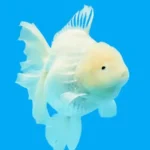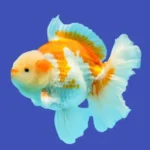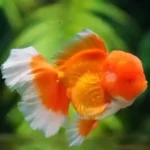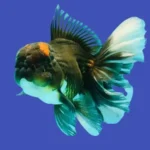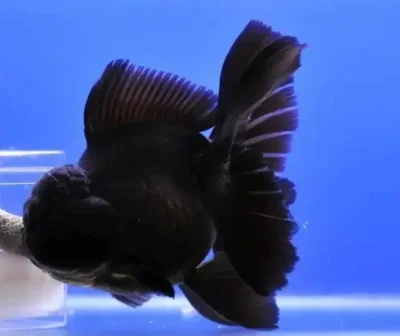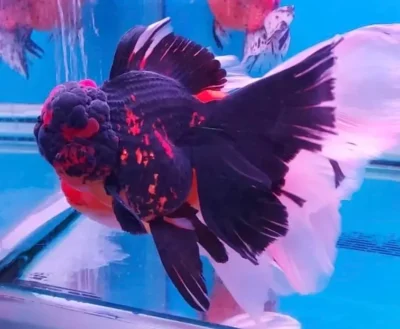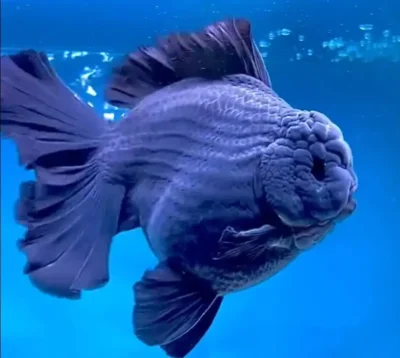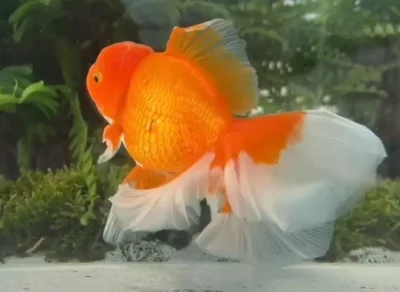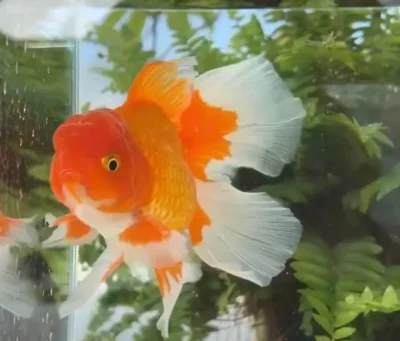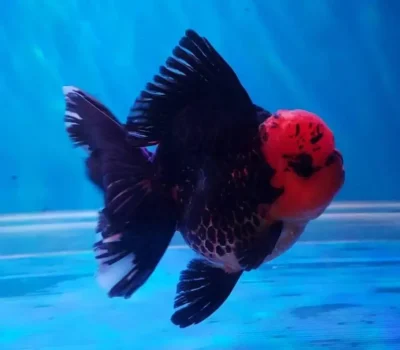The Thai Oranda goldfish is one of the most stunning and exotic members of the fancy goldfish family. Known for its wen, round body, and flowing fins, this variety has been selectively bred in Thailand for superior color, size, and overall quality.
Unlike standard Orandas, Thai Orandas are admired for their refined features, vibrant patterns, and graceful swimming style. Their personalities are equally appealing. They are peaceful, playful, and almost look “puppy-like” in how they interact with humans.If cared for properly, Thai Orandas can become the centerpiece of your aquarium for 10–15 years, and in some cases, they may even live up to 20 years.
What Makes Thai Orandas Special?
-
Exquisite Colors: Thai Oranda Goldfish are available in red, orange, black, white, panda patterns, and even tri-color combinations.
-
Flowing Fins: Their split tails and long dorsal fins create a flowing, elegant movement.
-
Wen Development: The wen is often larger and more refined than in regular Orandas.
-
Size: The adults grow 8–12 inches, with jumbo varieties exceeding this size.
-
Personality: Gentle, curious, and perfect for community tanks with other fancy goldfish.
1) Life Span Thai Oranda Goldfish
3) Water Parameters for Thai Oranda Goldfish
7) Breeding Thai Oranda Goldfish
10) Final Thoughts
Thai Oranda Goldfish vs. Standard Oranda Goldfish
While both belong to the same species, the difference lies in breeding quality:
Standard Oranda: Originated in China; quality can vary widely.
Thai Oranda: Selectively bred in Thailand for superior size, color, and wen development.
In short, Thai Oranda Goldfish are a premium version of Oranda Goldfish.
Popular Varieties of Thai Oranda Goldfish
Black Thai oranda
Black Thai Oranda is a type of Oranda goldfish that is known for its large black body, big head growth, and flowing long tails. They are a popular choice of Black oranda goldfish due to their beautiful appearance and flowing tails.
Black Thailand Oranda can grow up to 12 inches long if kept in a large aquarium tank and have a lifespan of 10-15 years if proper care is taken.
Red and black Thai Oranda
The Red and Black Thai Oranda is a stunning variety of Thai oranda goldfish known for its elegant black body with vibrant red accents which gives them a beautiful appearance and is more popular among goldfish enthusiasts.
Panda Thai Oranda
The Panda Thai Oranda is a beautiful and unique variety of Thai Oranda goldfish. It is characterized by its black-and-white coloration, which resembles a panda bear.
Panda Thai Orandas have a round body with a large, fluffy head growth. The head can be solid black, solid white, or a combination of both colors. The tail fin is fan-shaped and can be either black or white. Panda Thai Orandas are peaceful community fishes and can eat a variety of foods that are pellet-like.
Jumbo Thai Oranda
Jumbo Thai Oranda goldfish are large-sized Oranda goldfish that have been selectively bred for their impressive size.
Jumbo Thai Oranda goldfish can grow significantly larger than standard-sized Orandas. They can reach sizes of up to 12 inches or even larger, depending on their genetics, diet, and living conditions. Just like standard-sized Orandas, jumbo Thai Orandas have a prominent wen on their head. Jumbo Thai Oranda goldfish come in a variety of colors and patterns, ranging from red, white, black, and multiple colors.
Overall, jumbo Thai Oranda goldfish are stunning additions to large aquariums. Their impressive size, beautiful appearance, and unique features make them a favorite among goldfish enthusiasts.
Tri-Color Thai Oranda
Tri-color Thai Oranda goldfish are a beautiful variety of Thai Oranda characterized by their three distinct color patterns. They typically display a combination of red, white, and black colors, creating an eye-catching appearance. Their coloration and head growth make them beautiful and highly sought after among goldfish enthusiasts.
Rosetail Thai Oranda
The Rosetail Thai Oranda goldfish or the Orchid tail Thai Oranda is a stunning variety of oranda goldfish known for their elaborate tail resembling the petals of a rose.
This unique rose tail structure sets them apart from other Oranda varieties, making them highly prized among Oranda Goldfish enthusiasts. Their appearance and graceful movement make them a beautiful addition to any aquarium.
Apache Thai Oranda Fish
The Apache Thai Oranda fish is a variety of the Oranda goldfish, known for its vibrant red and black coloration. These fish are bred in Thailand and their unique appearance and swimming style makes them a beautiful addition to any Goldfish Tank.
Life Span Thai Oranda Goldfish
With proper care, Thai Orandas live 10–15 years, and some exceptional ones may exceed 20 years.
Tips for Longevity
-
Provide a spacious tank: minimum 20 gallons for one fish, 40+ gallons for groups.
-
Keep water temperature between 70–82°F and pH at 6.8–7.8.
-
Ensure strong but gentle filtration to remove toxins without creating currents.
-
Feed a balanced diet (pellets, vegetables, occasional protein treats).
-
Perform regular water changes to maintain top-quality conditions.
Tank Setup for Thai Oranda Goldfish
Minimum Tank Size for Thai Orandas
-
30 gallons for one fish.
-
50+ gallons if keeping them in groups.
Filtration & Aeration
-
Use an external canister filter for large tanks.
-
Add air stones or gentle bubblers to maintain oxygen levels.
-
Avoid strong water currents as Orandas are not powerful swimmers.
Substrate & Decor
-
Choose smooth gravel or sand. Sooth gravel or sand does not hurt Thai Orandas even if they eat up. They would excrete them.
-
Use soft plants to create a natural environment.
-
Provide open and wide swimming space.
Water Parameters for Thai Oranda Goldfish
-
Water Temperature to be around 70–82°F (21–28°C)
-
pH: 6.8–7.8
-
Hardness of watter: 5–19 dGH
-
Ammonia & Nitrite: Always best around 0 to 1 ppm
-
Nitrate: Below 20 ppm
Diet & Feeding
Thai Orandas are omnivores and love a varied diet.
Recommended Foods
-
Staple food: High-quality goldfish pellets (slow-sinking preferred).
-
Vegetables occasionally: Peas (shelled), spinach, lettuce, zucchini.
-
Occasional Treats: Bloodworms, brine shrimp, daphnia.
Feeding Routine
-
2 to 3 small meals a day.
-
Only feed what they can eat in 5 minutes.
-
Avoid overfeeding to prevent swim bladder problems and water pollution.
Tank Mates for Thai Oranda
-
Best Matches: As Thai oranda are soft and slow movers Other fancy goldfish like Ranchu, Lionhead, Ryukin, Black Moor would be suitable.
-
Avoid: Fast swimmers and aggressive fish like cichlids or fin-nippers which keep niiping thier fins and create stress.
Common Health Issues
-
Swim Bladder Disorder: Often occurs from overfeeding. It can be solved by identifying earliers an dfeeding them with digestive food like peas and sometimes fasting.
-
Ich (White Spot Disease): Combination of Stress and water quality related issues. I dentify early, Treat with aquarium salt/medication.
-
Fin Rot: Caused by poor water quality; treat with clean water and medicine.
-
Bacterial/Fungal Infections: Common due to wen structure, water quality. keep the water clear.
Breeding Thai Oranda Goldfish
Breeding Thailand Orandas can be rewarding but requires planning.
Steps for Breeding
-
Select healthy adult pairs (1 year+).
-
Increase tank temperature gradually from 25°C to 28°C to mimic spring.
-
Provide spawning mops/plants for eggs to stick. This give confidence to female thai Oranda to lay their Eggs.
-
Female can lay up to 1,000 eggs for a day or two.
-
Remove parents after spawning to prevent them from eating the egg.
-
Eggs hatch in 2–4 days; fry swim freely after 5–7 days.
-
Feed fry with baby brine shrimp or powdered food.
Thai Oranda Goldfish Cost
The cost of Thai oranda Goldfish depends on their age, size, coloration, and quality.
-
Juveniles: $30–60
-
Adults with vibrant colors: $50–300
-
Rare or show-quality fish: $500–$1,000+
FAQs on Thai Orandas
Q1: Are Thai Orandas beginner-friendly?
Yes, if you’re ready to invest in filtration, a large tank, and consistent water care.
Q2: Do they need heaters?
Yes, especially if room temperatures fall below 70°F.
Q3: Can they live in ponds?
Yes, in warmer climates with proper aeration and space.
Q4: Why are they so expensive?
Because they’re selectively bred in Thailand for superior looks and size.
Final Thoughts
The Thai Oranda goldfish is a breathtaking fish that combines beauty, grace, and personality. With their flowing tails, brilliant colors, and charming behavior, they’re often seen as the showpiece of aquariums.
While they need careful maintenance, the reward is years of joy watching them grow, thrive, and brighten your home. If you want a fish that’s both exotic and full of character, the Thai Oranda is an excellent choice.

